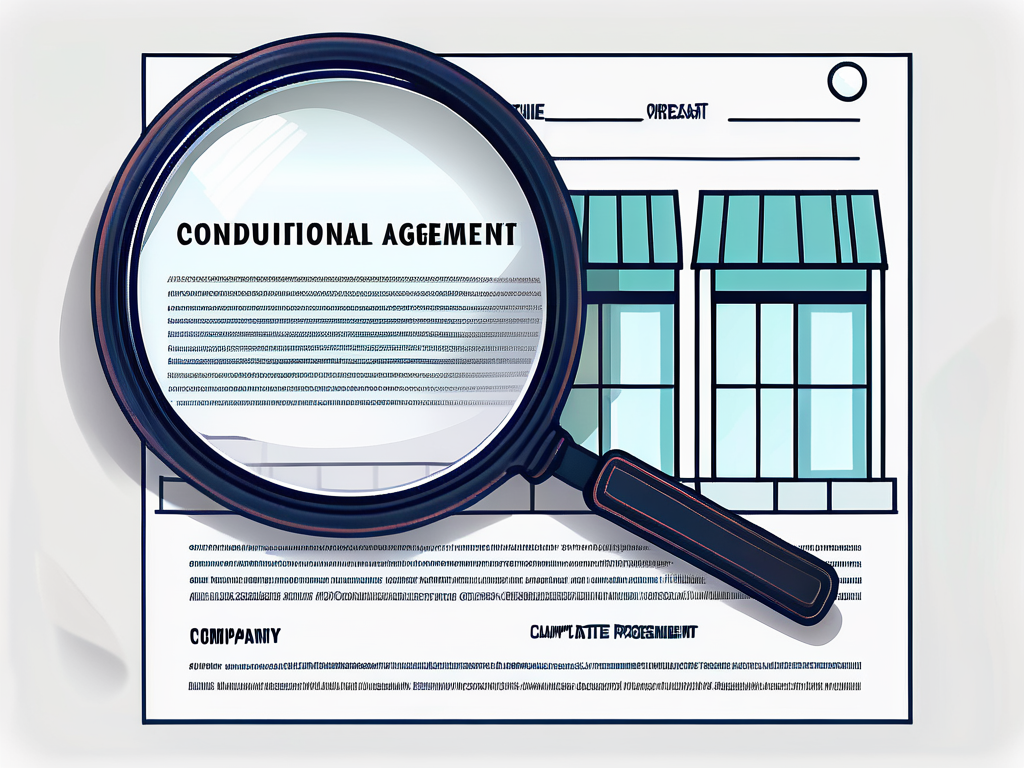Understanding the Real Estate Purchase Agreement


The real estate purchase agreement is a vital document in the home buying process. It serves as a legally binding contract between the buyer and seller, outlining the terms and conditions of the transaction. Whether you are a first-time homebuyer or an experienced investor, understanding the intricacies of the purchase agreement is essential to protect your interests and ensure a smooth transaction.
The Basics of a Real Estate Purchase Agreement
Before delving into the specifics, let's start with a brief overview of what a real estate purchase agreement entails.

A purchase agreement, also known as a sales contract or purchase contract, is a legally binding document that outlines the terms and conditions of a home sale. It serves as an agreement between the buyer and seller, establishing the rights and obligations of both parties.
For example, let's say you're a buyer interested in purchasing a charming two-bedroom cottage in a sought-after neighborhood. After viewing the property and negotiating the price, you and the seller come to an agreement on the terms. This is where the purchase agreement comes into play, ensuring that both parties are on the same page regarding the sale.
Now, let's explore the key elements that make up a real estate purchase agreement.
First and foremost, the agreement should clearly identify the parties involved, including the buyer and seller's names and contact information. It should also provide a detailed description of the property being sold. This includes the address, legal description, and any additional features or conditions.
The purchase price and payment terms are another crucial aspect. The agreement should specify the total purchase price, as well as the agreed-upon method of payment, such as cash, financing, or a combination of both. It may also outline any contingencies related to the financing, such as the buyer's ability to secure a mortgage loan.
Additionally, the purchase agreement may include contingencies and clauses to protect both the buyer and seller. These could involve provisions for home inspections, repairs, or other conditions that must be met before the sale is finalized.
Now, let's dive deeper into the importance of these key elements. The identification of the parties involved is crucial to ensure that the agreement is enforceable. By clearly stating the names and contact information of the buyer and seller, any potential confusion or misunderstandings can be avoided. This allows for effective communication throughout the entire process.
Furthermore, the detailed description of the property being sold is essential for both parties to have a clear understanding of what is included in the sale. This includes not only the address and legal description but also any additional features or conditions that may affect the value or desirability of the property. By providing this information upfront, the buyer can make an informed decision, and the seller can avoid any disputes or disagreements later on.
When it comes to the purchase price and payment terms, clarity is key. By specifying the total purchase price and the agreed-upon method of payment, both parties can have a clear understanding of their financial obligations. This helps to avoid any confusion or disputes regarding the agreed-upon price and payment schedule.
Lastly, the inclusion of contingencies and clauses in the purchase agreement is crucial to protect the interests of both the buyer and seller. These provisions allow for certain conditions to be met before the sale is finalized, providing a level of security and peace of mind for both parties. Whether it's a contingency for a home inspection or repairs, these clauses ensure that the buyer is satisfied with the condition of the property and that the seller is aware of any necessary repairs or adjustments.
In conclusion, a real estate purchase agreement is a vital document that outlines the terms and conditions of a home sale. By including key elements such as the identification of parties, a detailed property description, purchase price and payment terms, as well as contingencies and clauses, both the buyer and seller can enter into the transaction with confidence and clarity.
Parties Involved in a Real Estate Purchase Agreement
A real estate purchase agreement involves several parties, each with their own roles and responsibilities.
In addition to the buyer and seller, there are other key players involved in a real estate transaction. One important party is the real estate agent, who acts as a liaison between the buyer and seller, helping to facilitate communication and negotiations. The agent can provide valuable market insights, assist in setting a competitive price, and guide both parties through the complex process of buying or selling a property.
Role of the Buyer
As the buyer, your role is to carefully review the purchase agreement and ensure that your rights and interests are adequately protected. You may want to consult with a real estate attorney to assist you in understanding the legal implications of the agreement and to help negotiate the best terms.
Furthermore, the buyer is responsible for conducting due diligence on the property, which may include inspections, appraisals, and reviewing any homeowner association documents. This thorough investigation is crucial to uncover any potential issues that could affect the property's value or desirability.
For instance, as a buyer, you may include contingencies in the agreement that allow you to back out of the deal if certain conditions are not met, such as a satisfactory home inspection or securing financing.
Role of the Seller
The seller's role is to provide accurate information about the property and to negotiate the terms of the sale. They must also ensure that any required disclosures, such as known defects or liens on the property, are provided to the buyer.
Moreover, the seller is typically responsible for making any necessary repairs or improvements as outlined in the purchase agreement. This could involve addressing issues identified during inspections or ensuring that the property meets certain standards before the closing date.
For example, a seller might include a clause in the purchase agreement that states the property is being sold "as-is" without any warranties, limiting their liability for any potential issues or defects.
Understanding the Terms and Conditions
As mentioned earlier, the purchase agreement outlines the terms and conditions of the sale. Let's take a closer look at some of the key aspects.

Understanding the terms and conditions of a purchase agreement is crucial for both buyers and sellers in a real estate transaction. It serves as a legally binding document that governs the sale of a property and helps protect the interests of all parties involved.
Price and Payment Terms
The purchase agreement clearly specifies the purchase price of the property. This includes the total amount to be paid by the buyer, as well as the agreed-upon method and schedule of payments.
Additionally, the payment terms may outline any potential penalties for late payments or incentives for early payment. It is essential for both parties to adhere to these terms to ensure a smooth and successful transaction.
Property Description and Condition
The purchase agreement includes a detailed description of the property, including its address, legal description, and any additional features or conditions.
Furthermore, the property condition section may detail the current state of the property, including any known issues or defects. This information is crucial for buyers to make informed decisions and for sellers to disclose all relevant information about the property.
Contingencies and Clauses
Contingencies are provisions that allow a party to exit the contract under specific circumstances. Common contingencies include financing contingencies, home inspection contingencies, and appraisal contingencies.
Moreover, the purchase agreement may contain clauses that address various scenarios that could arise during the transaction. These clauses help protect the interests of both parties and provide guidelines for resolving disputes or unforeseen circumstances.
Legal Aspects of a Real Estate Purchase Agreement
Understanding the legal aspects of a real estate purchase agreement is vital to protect your rights and interests throughout the transaction. A real estate purchase agreement is a legally binding contract that outlines the terms and conditions of a property sale. It serves as a roadmap for the transaction, detailing important aspects such as the purchase price, closing date, contingencies, and responsibilities of both the buyer and seller.
Before signing a purchase agreement, it's crucial to review and understand all its provisions to ensure that your rights are adequately protected. Consulting with a real estate attorney can provide you with valuable insights and guidance to navigate the complexities of the agreement.
Legal Requirements for a Valid Agreement
A valid purchase agreement must meet certain legal requirements to be enforceable. These requirements may vary by jurisdiction, so it's essential to consult with a real estate attorney or professional familiar with local laws. In addition to the basic elements of a contract, such as offer, acceptance, and consideration, real estate purchase agreements often include specific provisions related to property disclosures, financing terms, and closing procedures.
Ensuring that all legal requirements are met helps protect both parties from potential disputes and ensures a smooth and successful real estate transaction.
Consequences of Breaching the Agreement
Breaking a purchase agreement can have serious consequences for the party in breach. The non-breaching party may be entitled to remedies such as financial damages or specific performance, which is a court order enforcing the terms of the agreement. It's important for both buyers and sellers to understand their obligations under the agreement to avoid the risk of breaching its terms.
For example, if the buyer backs out of the agreement without a valid reason, the seller may be entitled to retain the buyer's earnest money deposit or seek additional damages. Understanding the potential consequences of breaching a purchase agreement can help parties make informed decisions and act in good faith throughout the transaction.
The Closing Process
The closing process is the final step in the home buying journey. It involves the legal transfer of ownership from the seller to the buyer.
Once all the negotiations have been finalized and the terms of the sale have been agreed upon, the closing process marks the culmination of the real estate transaction. It is a crucial stage that requires meticulous attention to detail to ensure a smooth transfer of ownership.
Preparing for Closing
Prior to the closing, both the buyer and seller should ensure that all the necessary paperwork and documentation are in order. This may include providing proof of insurance, completing any required inspections or repairs, and obtaining a title search and title insurance.
Additionally, it is essential for both parties to review the closing disclosure, which outlines all the costs associated with the transaction, including closing costs, loan terms, and any fees. This document provides a breakdown of the financial aspects of the deal and ensures transparency in the closing process.
For instance, the buyer may arrange for a home inspection to identify any potential issues or defects that need to be addressed before closing. This step is crucial as it allows the buyer to make informed decisions about the property and negotiate any necessary repairs or credits with the seller.
What Happens at Closing
During the closing, the parties involved, including the buyer, seller, real estate agents, and attorneys, gather to sign the final documents and complete the transaction.
Furthermore, the closing agent or escrow officer plays a vital role in facilitating the process by ensuring that all necessary documents are signed and notarized, funds are disbursed appropriately, and the transaction is recorded with the relevant authorities. Their expertise helps to streamline the closing process and minimize any potential issues that may arise.
For example, the buyer will typically sign the mortgage loan documents, while the seller will sign the deed transferring ownership of the property. These documents legally bind both parties to the terms of the sale and signify the official transfer of the property from the seller to the buyer.
Tips for Navigating a Real Estate Purchase Agreement
Negotiating and navigating a real estate purchase agreement can be a complex process. Here are some tips to help you ensure a successful transaction.

Importance of a Real Estate Attorney
Hiring a real estate attorney to review the purchase agreement and provide legal guidance can be invaluable. They can help you understand the terms, negotiate on your behalf, and ensure that your rights are protected.
For example, an attorney may advise you on including specific contingencies and clauses in the purchase agreement to safeguard your interests. These contingencies could include provisions for a home inspection, financing, or the sale of your current property. By having a knowledgeable attorney by your side, you can navigate the intricacies of the agreement with confidence.
Negotiating the Best Terms
Don't be afraid to negotiate! The purchase agreement is a negotiation between the buyer and seller, and each party should strive to achieve their best interests.
For instance, the buyer may negotiate for a lower purchase price or request repairs to be completed before closing. The seller, on the other hand, may negotiate for a shorter closing timeframe or request a higher purchase price. It's important to approach negotiations with a clear understanding of your goals and priorities, as well as a willingness to compromise.
Additionally, it's crucial to thoroughly review and understand the terms of the agreement before entering into negotiations. This will allow you to identify areas where you may have leverage and areas where you may need to be more flexible.
Avoiding Common Pitfalls
Lastly, being aware of common pitfalls can help you navigate the purchase agreement process more effectively. Some common pitfalls include failing to conduct proper due diligence, rushing through the process, or undervaluing the importance of legal advice.
Proper due diligence involves thoroughly researching the property, including its history, any potential liens or encumbrances, and the neighborhood. Rushing through the process can lead to oversights or missed opportunities for negotiation. Seeking legal advice is crucial to ensure that you fully understand the legal implications of the agreement and that your rights are protected.
By taking the time to thoroughly understand and review the purchase agreement, seeking professional advice when necessary, and being proactive in your negotiations, you can navigate the real estate purchase agreement with confidence and ensure a successful transaction. Remember, a well-negotiated and carefully crafted purchase agreement can set the foundation for a smooth and satisfying real estate transaction.
Ready to Take Control of Your Home Sale?
Empower yourself with the knowledge and tools to sell your home successfully with SmartSellersMatch.com. Our comprehensive FSBO course, available for free, is designed to guide you through every step of selling your home online. From a library of essential documents to our innovative FSBO Assistant chatbot, we provide the expertise you need. Don't leave your home sale to chance—take the free FSBO Course today and match with success!





